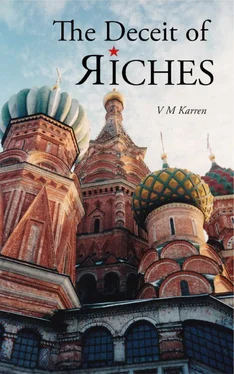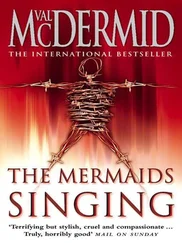Val Karren - The Deceit of Riches
Здесь есть возможность читать онлайн «Val Karren - The Deceit of Riches» весь текст электронной книги совершенно бесплатно (целиком полную версию без сокращений). В некоторых случаях можно слушать аудио, скачать через торрент в формате fb2 и присутствует краткое содержание. Год выпуска: 2017, Издательство: Fly by Night Press, Жанр: Триллер, на английском языке. Описание произведения, (предисловие) а так же отзывы посетителей доступны на портале библиотеки ЛибКат.
- Название:The Deceit of Riches
- Автор:
- Издательство:Fly by Night Press
- Жанр:
- Год:2017
- ISBN:нет данных
- Рейтинг книги:3 / 5. Голосов: 1
-
Избранное:Добавить в избранное
- Отзывы:
-
Ваша оценка:
- 60
- 1
- 2
- 3
- 4
- 5
The Deceit of Riches: краткое содержание, описание и аннотация
Предлагаем к чтению аннотацию, описание, краткое содержание или предисловие (зависит от того, что написал сам автор книги «The Deceit of Riches»). Если вы не нашли необходимую информацию о книге — напишите в комментариях, мы постараемся отыскать её.
The Deceit of Riches — читать онлайн бесплатно полную книгу (весь текст) целиком
Ниже представлен текст книги, разбитый по страницам. Система сохранения места последней прочитанной страницы, позволяет с удобством читать онлайн бесплатно книгу «The Deceit of Riches», без необходимости каждый раз заново искать на чём Вы остановились. Поставьте закладку, и сможете в любой момент перейти на страницу, на которой закончили чтение.
Интервал:
Закладка:
Body guards first from behind stepped out of the car and scoped the square. They looked directly at me and I stood and blinked at them like a possum caught in the headlights of a speeding car. Then the back door of the Mercedes swung open and out stepped the bald head of a man I met not a week ago at his night club. Mr. P. himself had just arrived. I stood and watched as he and his entourage pushed themselves deftly into and through the crowd of police men and protesters and thru a smaller door that the protesters had gathered in front of.
As Mr. P. and his thugs disappeared into the building amid shouts and raised fists from the protesters I headed into the line of police men behind them, pushing just as I saw Mr. P’s guards do. It worked. As I passed the last layer of police officers, stepping in front of their shields, I entered in the thick of the protestors who turned out to be very un-intimidating. The group was made of older women in head scarves and older men without teeth in shabby overcoats holding handmade photos and placards of the old communist guard. I smiled at them all meekly and motioned toward the doors behind them, and they let me pass without shouts of blood and brimstone on my head. Without a limousine or bodyguards, I must have appeared harmless to both the police and the protestors.
I slipped into the room unnoticed and took a seat in the back. Richard and Andrew were present but were working closely with an interpreter and staffers trying to keep up themselves with what was going on and hastily giving orders and scribbling in their notepads. The auction was held in a cramped conference room set up with the auctioneer at the head of the room and the bidders in the first two rows, twelve people in total. Next to the auctioneer was a stack of files on a low table, each containing a property and license representing a retail store somewhere in the city, that were all for auction. Each file had a number on it which corresponded to the program given to the bidders with detailed descriptions of what was on offer. The session started after a delay from the official observers sitting front left at a long table draped in a green cloth. They pointed into the crowd and whispered frantically.
I did not see Mr. Gaidar nor Mr. Nemtsov in the room much to my disappointment. Of course, they were present just for the photo opportunity and sound bites that had happened just before I arrived. They hadn’t come to actually run the auction. I felt rather foolish that I had expected the governor himself, with the gavel in hand, would be personally selling off unwanted stores and warehouses.
As the bidding was opened after a long-winded reading of the rules and technicalities of the process it didn’t take long for the tension in the room to rise as the prices for the properties rose. The grand prize of the day was a run-down grocer directly opposite the Moscovskiy train station, on Filchenkova Street, on Revolution Square. The amount of foot traffic, bus traffic and automobile traffic and the parking spaces in front of it made it perfectly positioned for visibility and accessibility. I knew the location well. It was perfectly located for any retail sales. There were three primary groups in the contest for win this location with the needed permits; A group of the current store’s management team, a consortium of the store’s employees represented by their chairwoman and a lawyer, and Mr. P. The split between manager and workers of the store was palpable in the front row as both groups continued to up the ante and price for the property. Mr. P. sat silently as the two rivals scowled at each other and whispered amongst themselves with every extra hundred-thousand rubles being committed. The observers were breathless as the price spiraled higher and higher.
Neither group, the managers or the staff consortium would have the money to purchase the store and its operations outright. It would require a mortgage and then the staff’s entire wages for several years to be able to pay the debt of acquisition. Would they be able to turn a profit? Nobody really knew. The banks behind the offered mortgages perhaps didn’t know either but at least they would have a valuable property in their hands should the owners fail to pay the mortgage. The only person that could purchase the lot outright was Mr. P., but he wasn’t lifting his paddle to signal his interest. He sat idly by while the managers and workers battled it out. Only after the price rose above two million rubles did Mr. P. even start to twitch.
“Two-million ten thousand, two-million twenty thousand, two-million twenty-five thousand, two-million twenty-seven thousand rubles…,” and the bidding started losing steam.
The price stopped rising by ten thousands and was now clawing higher at smaller and smaller increments. The auctioneer looked at the workers’ representatives and asked if there was any higher bid from their side. After a quick consultation with the lawyer with the chairwoman from the workers’ group, she shook her head and then bowed it, defeated and deflated. The managers’ group was now on the line for close to forty thousand dollars. The room held its collective breath. Just before the gavel was dropped, Mr. P. finally put his hand and offered two million twenty-eight thousand rubles… and the bidding found a second wind. The price finally settled at two million thirty-three thousand rubles. It was no surprise who had the longest breath. Mr. P. wouldn’t even have to sell his Mercedes to be able to front forty thousand dollars. The bank would simply book the escrow over to the city’s account and the property would change hands without anybody even handling the cash.
The bidders were furious. The workers’ chairwoman stood up and berated the auctioneer. The lawyer accompanying the managers’ delegation said that they would file an appeal and then both turned and started shouting at Mr. P. who didn’t show any emotion, except to check his wrist watch, his Rolex wrist watch to be exact. His arrogance oozed out of him and left rings under the armpits in his crisp white Swiss made shirt. Would either the managers or the workers still have a job tomorrow? Doubtful. They would probably be replaced with Mr. P.’s hangers-on and friends and family aligned with his current enterprises. All the current managers and staff could do was protest and shout and insult Mr. P., but everybody knew the way this auction system worked. The highest bidder had won.
The exasperation from the observers’ table was visible as well, but they had to admit, just like everybody else in the room that the bidding process was fair and transparent and that the auctioneer followed all the rules as they had been explained at the beginning. There was no irregularity to appeal. With this ruling from the neutral observers, the managers’ delegation stood and left in a flurry of accusation and finger pointing. The chairwoman from the workers’ group looked directly at Mr. P., and told him that they would find a way to stop him from taking over their store, gathered her handbag and departed with her lawyer as well. I suppose it wasn’t the fact that Mr. P. had won the bidding, but it was the contempt that he showed everybody in the room by waiting until the very end, after driving up everybody’s hopes, and then simply outbidding them by one thousand rubles each time, just baiting them. He could have easily started the bidding at two million rubles, but instead, he tried to get it for less by waiting to understand the competition’s highest threshold. He allowed the others to feel the dream so close; the dream of working for themselves, making a good living, taking pride in their enterprise, and be rewarded financially for their labor and sacrifices; and then smashed them in an offhand fashion for just another cold investment. He then went on to buy up three smaller properties in the city for almost nothing as the other parties had all left the event in disgust, leaving him to purchase what he wished at will for prices far below fair market values. It was a disgusting display of how wealth can manipulate a system being lauded in the press and around the world as being so open, fair and transparent. The closer one looked, the less this was the reality in Nizhniy’s successes. Businesses were being privatized for the highest prices the government could earn, but at what cost? Was there not a more just way of reaching the same goal? Did the swing from communism to capitalism require rubbing the noses of the law-abiding citizens in the disdain of the illegally wealthy? Surely there was a more just way. Surely there was a way to plan for a better long-term perspective than just jettisoning assets to the highest bidders regardless of the origin of the funds. What was to be done?
Читать дальшеИнтервал:
Закладка:
Похожие книги на «The Deceit of Riches»
Представляем Вашему вниманию похожие книги на «The Deceit of Riches» списком для выбора. Мы отобрали схожую по названию и смыслу литературу в надежде предоставить читателям больше вариантов отыскать новые, интересные, ещё непрочитанные произведения.
Обсуждение, отзывы о книге «The Deceit of Riches» и просто собственные мнения читателей. Оставьте ваши комментарии, напишите, что Вы думаете о произведении, его смысле или главных героях. Укажите что конкретно понравилось, а что нет, и почему Вы так считаете.












